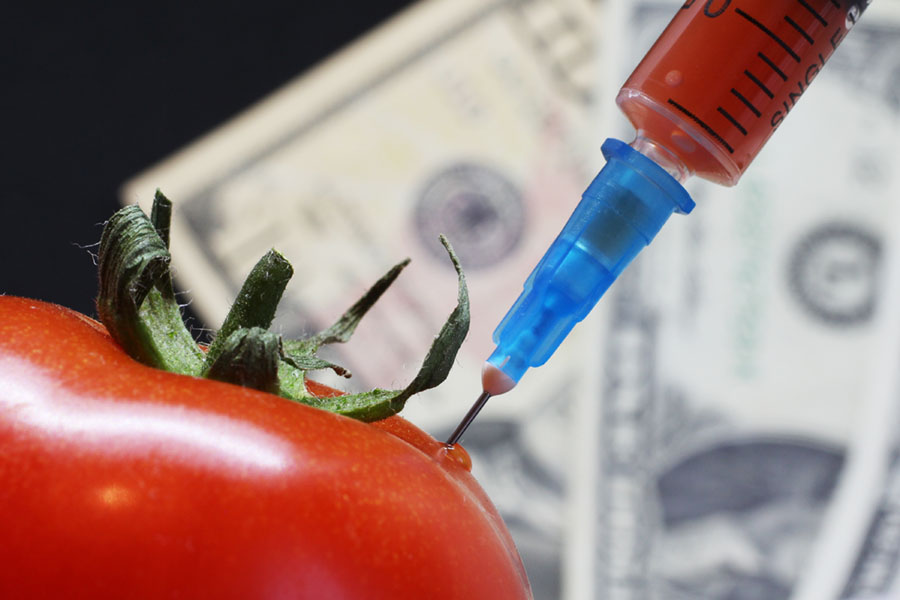
The Argument for GM Foods Dangers
The Argument for GM Foods Has Not Been Proven and the Debate Rages on All Over the World While the Production of GM Foods Increases to Further Elite Agendas.
While the argument for GM foods, or genetically modified foods is nothing new, genetic engineering is different from the traditional methods because it transfers genes from one species to another.
The traditional method of cross-pollination was largely safe because breeders crossbred organisms of the same species where the DNA was basically the same.
But now genes are being transplanted from unrelated organisms and among different species with sometimes and bizarre and fantastic results.
An example of this is a soybean variety that has been engineered to carry a gene from bacteria that is resistant to weed killers.
When the field of this soybean crop is sprayed, everything dies except the crop.
What we don’t know is what will happen when the weeds accidentally assimilate these genes and become ”super weeds” which has already begun to occur.
An argument for GM foods is that the environment will not be damaged as the need for pesticides will decrease.
However, there is a good chance they may hurt harmless or useful insects also, or perhaps the insects will become resistant to the pesticides grown in the genetically modified crops.
Clearly, genetically modified food crops are akin to unleashing a Frankenstein on the world.
The question of whether or not genetically modified foods could reduce world hunger has not been tested as the crops available so far have done nothing to address this problem in developing countries.
Even worse, the farmers choosing to grow genetically modified foods have to rely on the multinational corporations that control the market for seeds.
This is because GM food seeds are also genetically modified to produce a plant only once, so the farmers are forced to buy seed every year as they cannot grow seed themselves.
The industry of genetically modifying foods is a completely un-regulated market which leads to monopolies and questionable ethics by the corporations controlling this market.
The elite own the companies that benefit from the GM foods and seeds and therefore are reluctant to make any changes, even if they are for the benefit of people.
The argument for GM foods is that farmers will be able to produce larger crops, achieving larger profits, but in reality, since the market is not regulated, farmers have to pay a premium and a ”technology fee” for buying genetically modified seeds with no promise of finding a market for their crops.
In her book Food Fray: Inside the Controversy Over Genetically Modified Food, Lisa Weasel argues that people around the world have said they would not want to eat genetically modified or engineered foods.
The harsh fact is that in the United States most people eat GM foods daily, but they don’t know it.
The fear is that multinational corporations that are genetically modifying foods and putting patents on the foods they are developing will eventually be able to hold all of us hostage for their GM seed.
The elite virtually control the food chain which gives them an inordinate amount of power for their New World Order.
Once traditional farming has changed to genetically modified farming, food will become our ”new oil crisis,” with the seed multinationals holding us hostage.
To counter this possibility, groups have sprung up around the world to protect and multiply so-called heritage seed–seed that is produced by farmers and passed on, untouched by genetic engineers.
Ethics and the Argument for GM Foods
Genetically modifying foods poses philosophical, ethical and religious problems for a great many people.
So far, governments and corporations are ignoring the rights of the ordinary people to know what they are eating. Genetically modified foods are not identified as such on labels.
In Europe, there has been a hysterical argument for GM foods and against it, with some scientists even claiming that GM crops are being grown without people even being aware of it.
The fear is that food, and therefore life itself, will become commercial property as the corporations that control the market are patenting the genetically modified seeds to protect their commercial interests.
We should be concerned about the small number of multinational corporations having ownership of food resources and turning over control for food production.
Environment Concerns over GM Foods
There is also great concern that the genetically modified crops could accidentally spread to non-genetically modified crops by cross-pollination.
Those who promote the argument for GM foods tell us that the introduction of a gene that would make crops resistance to chemical pesticides would lower our need for chemicals.
But in reality, this gene could just as readily be transferred to weeds, producing ”super weeds,” and also contaminating the soil and water.
The fact is, we do not know what effects genetically modified foods will have on the environment and probably will not know for many years to come, when it will be too late.
Health Concerns Over Genetically Modified Foods
The possibility of new allergens being created is very likely in GM foods. Say, for instance, a brazil nut gene was to be introduced into soybeans.
People who are allergic to brazil nuts would probably also be allergic to the genetically modified soybean.
Tests in rats have shown extensive intestinal problems, allergic reactions, and pre-cancerous cells.
However, testing has not been done long enough to predict what problems humans may have with genetically modified foods.
The elite are dragging their feet on this issue; perhaps they know the answer already.

 My First Amazing Ayahuasca Experience
My First Amazing Ayahuasca Experience  Pine Needle Tea
Pine Needle Tea  The REAL Controllers of Humanity: The Papal Bloodlines
The REAL Controllers of Humanity: The Papal Bloodlines  Is it Global Warming or Cooling?
Is it Global Warming or Cooling?  Gun Rights and Obama Examined
Gun Rights and Obama Examined